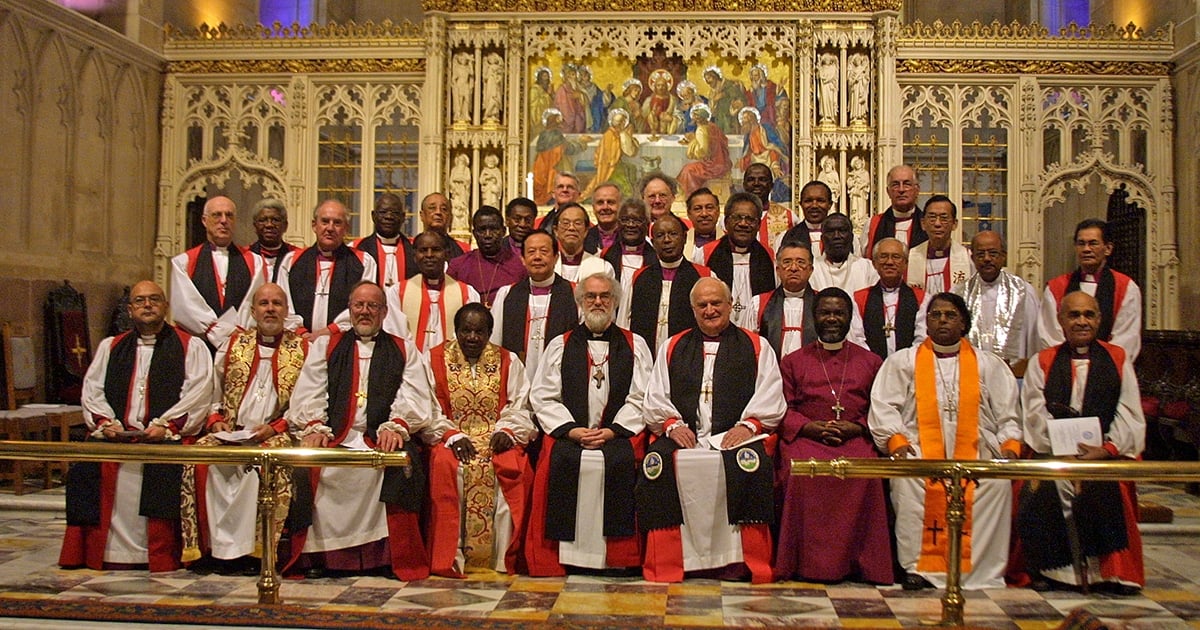The second instalment, following the first, on the Primates’ meetings then and now.
The last four Primates Meetings, which took place every two years between 2005 and 2011, saw major discussions break out revolving around issues of human sexuality, particularly concerning the blessing of same-sex unions. Striving for unity amidst open differences, the differing views among Primates took on the character of a family disagreement within the Anglican Communion.
After the Episcopal Church in the United States consecrated an openly gay bishop and the Anglican diocese of New Westminster in Canada allowed the blessing of same-sex relationships, the issue of sexuality came to the fore at the 2005 Primates Meeting in Dromantine, Ireland.
Archbishop Andrew Hutchison, who became Primate of the Anglican Church of Canada in 2004, recalled his first Primates Meeting as “very, very tense,” with a group of Primates largely from the Global South registering their disapproval over the actions taken by their counterparts in the U.S. and Canada.
“There were 14 Primates who would not set foot in the chapel because the American Primate [Frank Griswold] and I were there … It was a pretty icy time,” Hutchison recalled.
The 2005 Primates Meeting was also the first for Paul Feheley, principal secretary to the Primate under Hutchison and to Hutchison’s successor Archbishop Fred Hiltz. The level of tension expressed by the Primates’ refusal to enter the chapel, even for the Eucharist service held by the Archbishop of Canterbury, stunned Feheley.
“For a new person coming in at that point, for me, that was staggering, because I don’t think it had ever occurred to me that people would choose to stay away from a Eucharist because so-and-so was sitting in the congregation,” he said.
Feheley described the 2007 Primates Meeting in Dar es Salaam, Tanzania as the “most difficult” of the four he attended, with tensions at an all-time high and a noticeable separation among the Primates. Among those in attendance was Episcopal Church Presiding Bishop Katharine Jefferts Schori, the first female Primate in the Anglican Communion.
Despite disagreements, the meeting again allowed Primates to understand the views of their foreign counterparts. Archbishop Hutchison offered the example of the Church of Nigeria, which opposes homosexuality and same-sex marriage but also faces an environment in which violence between Christians and Muslims is commonplace.
“Anglicans in Nigeria are in a very, very difficult spot because they are, to begin with, persecuted by the Muslim majority, and as Muslims hear that Anglicans are now in favour of the blessing of same-sex couples and so on, it gives one more reason for Muslims to reject and indeed punish Christians,” Hutchison said.
“That’s an issue for them. It’s not simply a matter of distaste for same-sex relationships. It’s a matter of their own safety and well-being … And by the way, that kind of understanding is one of the advantages of this kind of coming together despite our differences, [in] that you can listen to and hear and appreciate the issues that emerge for them locally.”
Friction remained at the 2009 Primates Meeting in Alexandria, Egypt, the first attended by Primate Fred Hiltz. The meeting took place at the height of activities surrounding the creation of the Anglican Church of North America, interventions by Primates from other jurisdictions, and conversations around a proposed worldwide Anglican covenant.
As a result, Archbishop Hiltz recalled the 2009 event as one wracked by tensions. Feheley, by contrast, said that the meeting marked the beginning of a gradual reduction in discord compared to previous meetings.
“This wasn’t because now suddenly everybody was seeing things in a liberal way or a conservative way,” Feheley said. “But you could begin to see the Communion saying, ‘OK, we need to work at this. We need to really try to understand Scripture and authority. We all know what the Scripture says on homosexuality, but we don’t agree on the interpretation.’”
With the lowering of tension, the 2011 Primates Meeting in Dublin, Ireland had an altogether different feel for Archbishop Hiltz. Though a number of Primates did not attend due to health reasons, visa issues, or declining to accept the Archbishop of Canterbury’s invitation, the meeting acknowledged those who were not present.
“We were painfully aware of that dynamic in our midst in Dublin, but upheld them every time we gathered to pray,” Archbishop Hiltz said. “Every time we were in a conversation, we were just mindful that they weren’t there and that we needed to be conscious of their voice and perspective in the conversation.”
Exploring a wide range of topics, the 2011 meeting produced notable statements on climate change and gender-based violence.
“If you look at the communiqués from the Dublin meeting in 2011, they were really positive,” Feheley said, noting that throughout all four Primates Meetings, Archbishop Rowan Williams continued to serve as a focus of unity in his role as Archbishop of Canterbury.
With Primates requested to make suggestions for the agenda at the next meeting, many concerns from Dublin will carry over into the 2016 Primates Meeting in Canterbury.
Visit the Anglican Church of Canada website for the third and final instalment in this chronological overview of the Primates Meeting.
